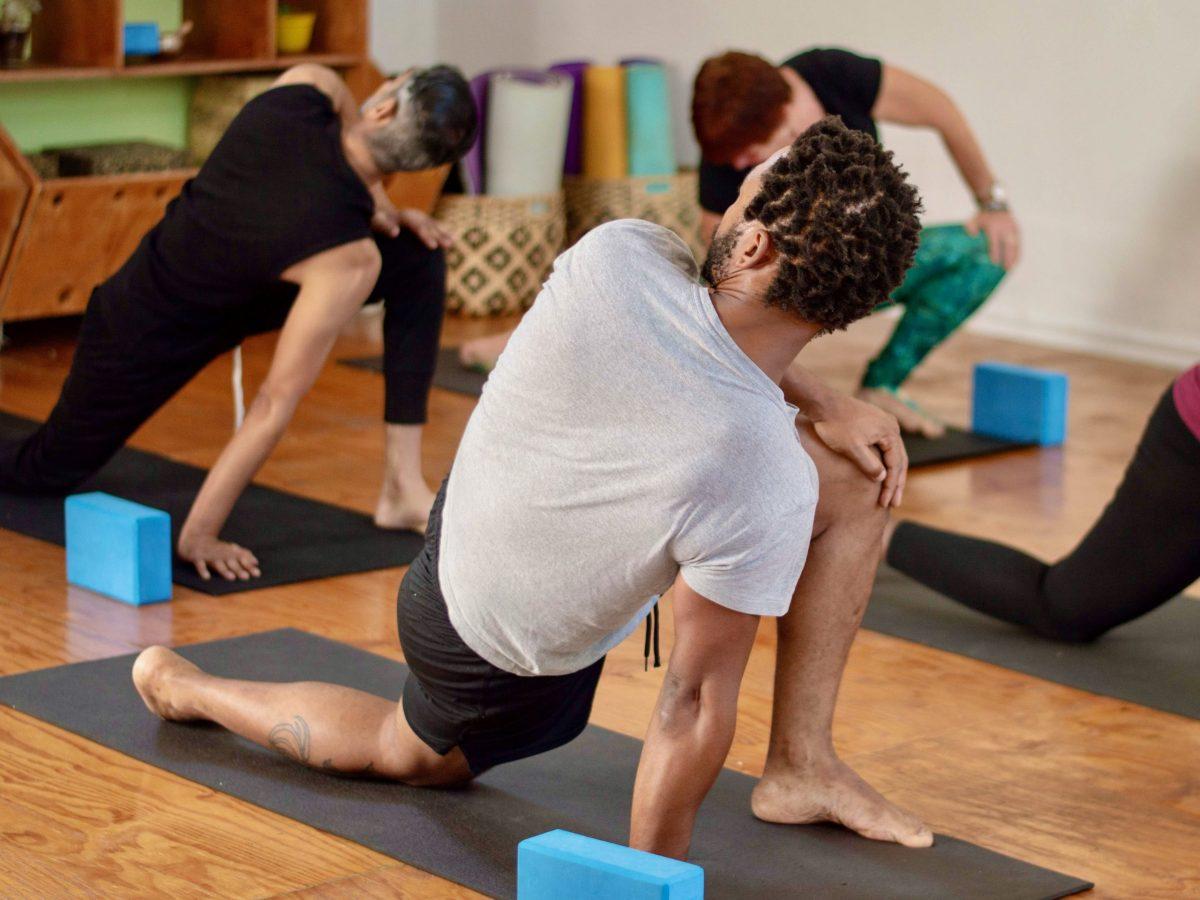Durban, South Africa — Nosizwe Mji, co-founder of The Toolbox yoga studio, began her yoga journey following a near-fatal car accident in 2006, her last year at the University of Cape Town. After two years of reconstructive surgeries for her extensive injuries, Mji found herself practicing yoga alongside her sister to support her body’s healing process.
“We just became completely obsessed with it. It was something that we did, just the two of us,” Mji said of her sister and studio co-founder Nomzamo Mji. ”It just completely spoke to me. Loved it, loved it, loved it, and very much the body recovery. I hadn’t gone in knowing enough about it being a holistic practice, but I found myself changing.”
After falling in love with yoga, Mji went to live with her aunt in Natick, Massachusetts, in 2011. There was a yoga studio a 10-minute walk down the road from her aunt’s home.
“That was my introduction to vinyasa, and, to be specific, Baptiste Power Vinyasa,” Mji said. “And that is where the self-inquiry started to come on.”
Baptiste Power Vinyasa, a type of hot yoga, had Mji hooked. For three months, she never missed a day practicing yoga.
“It’s an incredibly challenging practice, with the same elements of heat, like Bikram, but as part of it, the teachers bring so much self inquiry into the practice,” Mji said. “This is what yoga is about, and that’s where everything changed.”
While in the U.S. Mji did her first training with a teacher who connected Mji with Seacoast Power Yoga in Exeter, New Hampshire. There, Mji had her first experience managing a yoga studio.

In 2013, Mji left the U.S. to travel to India to complete yoga teacher training at an ashram in Rishikesh. Her sister and their mother met her in Rishikesh, where they each completed 200 hours of training.
Back in South Africa, the sisters founded The Toolbox in 2016, in the Morningside neighborhood of Durban.
Like the Mji sisters, Lilane Loots, a yoga instructor at The Toolbox, also completed yoga teacher training in India. She said the level of accessibility to yoga that is prevalent in India is key to The Toolbox’s mission.
“One of the things that we’ve all shared is the idea that yoga is always, particularly in South Africa, perceived as a particularly white, middle-class, practice,” Loots said. “And for [Nosizwe and Nomzamo Mji] particularly was this idea of really saying that yoga is for everybody.”
The Toolbox aims to expand the community of people who practice yoga, and specifically, make it accessible to Black South Africans, who experience high levels of poverty.
In 2021, 16.3 million South Africans were living below the international poverty threshold, which comprises more than 25% of the population.
“Poverty is an island in itself, so giving people tools to process and work through the trauma [is my mission],” Mji said. “It’s helped me and so, if it can, why not share it? This is my activism.”
Loots said the Mji sisters are important role models for other Black women in South Africa.
“Historically, it’s very unusual to see two Black women in a yoga class, and running a yoga class and teaching,” Loots said. “So for them, it was also the idea of representation. They are the most extraordinary, beautiful teachers. Even by virtue of them just being who they are, they’ve brought in communities that were historically not that interested in [yoga].”

The Toolbox classes are run with the goal that each participant experiences internal healing through the practice of yoga. The studio tagline is ‘Self Repair for Social Repair.’
“People are so exhausted,” Mji said. “You’re in survival mode, from living disconnected from ourselves.”
Sazi Dlamini, a yogi and friend of the Mji sisters, said he was encouraged by his daughter to find that connection at The Toolbox.
“When they opened, my daughter kind of complained that I should make time to [practice yoga],” Dlamini said. “It was an opportunity that showed itself at the time I was looking for a practice.”
Along with the founding of The Toolbox in 2016, the Mji sisters launched an after-school program at Christianenberg Primary School in Claremont, a former Black, apartheid-era township northwest of the center of Durban. The apartheid government created these townships under the Group Areas Act of 1950, forcibly moving Black and brown South Africans from areas reserved for white South Africans.
The Toolbox’s after-school program aims to expose young girls and boys in the township to the restorative movement and power of yoga while also giving them something to do after school.
“Most township schools do not have any type of after-school program,” Nosizwe Mji said. “The children have nowhere to go, and others [outside the townships] do.”
The school program has not been able to run for the past two years due to the pandemic, but it will be starting back up soon, Mji said. Additionally, the Mji sisters are looking into starting a day camp for the winter holidays when students are out of school.

Running a small business does not come without its own challenges.
“It’s not the easiest business, the business model,” Mji said. “And I’m in the process of my own healing. It’s also me in the same waters.”
Despite the challenges, the Mji sisters remain committed to their mission.
“I’m so grateful that I came back into this role as a Black African woman, and I’ve had the privilege to live in other places I don’t want to live in,” Mji said. “I want to live here. I want this to thrive. This is one of the solutions.”














































